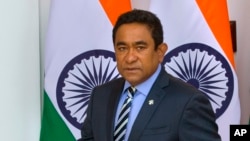A law that criminalizes defamation and provides for steep fines and jail terms for violators took effect in the Maldives with the president signing it Thursday despite widespread public outcry.
President Yameen Abdul Gayoom ratified the bill passed by Parliament on Tuesday.
The law criminalizes speech, writing and even sounds that are deemed defamatory or against any tenet of Islam. It puts the burden of proof on defendants. Convicted media companies and individual bloggers and social media users can be fined from $1,620 to $130,000.
Journalists working for registered media outlets can be fined up to $ 9,730 in addition to the fine imposed on their employer. Unpaid fines carry a jail term of up to six months.
Maldivian journalists and opposition politicians, as well as the European Union and the embassies from the U.S., Britain, Norway, Germany and the Netherlands, had urged the government not to pass the law.
The government promised to have a multiparty parliamentary committee study the bill and to take suggestions, but the ruling party dominated committee ignored objections and sent the bill to Parliament for voting.
After Parliament approved it, the activist group Transparency Maldives had urged the president to consider the concerns over the law before endorsing it.
Maldives became a multiparty democracy in 2008 and a year later defamation was made a civil offense, one of a number of democratic changes, but the country has lost much of those gains since then.
Gayoom has taken a stranglehold on power since his election in 2013. He is accused of manipulating the judiciary, police and bureaucracy to concentrate power and stifle the opposition.
At least four senior politicians — a former president, a former vice president a former defense minister and a political party leader are among those who have been given lengthy jail terms after trials criticized for a lack of due process.
The government is also accused of failing to investigate the case of a journalist went missing two years ago and is suspected to have been abducted. Also two media outlets have been shut down this year which critics say is the result of government pressure.




